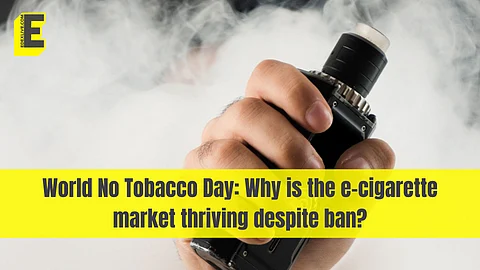

Public health experts have raised concerns over the increasing use of banned e-cigarettes — commonly known as vapes — among the Bengaluru's youth, warning that these devices are being disguised as flavoured candies to bypass detection and lure children into nicotine addiction.
Speaking ahead of World No Tobacco Day on May 31, experts said the tobacco industry is employing deceptive marketing strategies that portray vapes as trendy and harmless, misleading young users. They called for stricter enforcement of the ban and wider awareness campaigns to counteract the growing menace.
“E-cigarettes, which mostly contain nicotine, are falsely promoted as safer alternatives to cigarettes. That’s simply not true,” said Dr Thriveni BS, a public health expert. “If it were called an 'e-cigarette,' youngsters might hesitate. But calling it a 'vape' makes it sound cool and harmless. It’s a deliberate tactic.”
Dr Thriveni pointed out that these products are often sold in colourful packaging and flavoured varieties, mimicking objects such as USB drives, pens, highlighters, or toys — making them easy for children to conceal. “Unlike conventional cigarettes, vapes don’t have a strong odour, making it harder for parents to detect usage,” she said, stated a report by The New Indian Express.
Medical experts note that nicotine can reach the brain in just 10 seconds. Regular use may quickly lead to addiction, and withdrawal symptoms can include anxiety, irritability, difficulty concentrating, and sleep disturbances.
Despite the ban, vapes continue to be easily accessible. The Karnataka government, under the Karnataka Poisons (Possession and Sale) Rules, 2019, classifies nicotine as a Class ‘A’ poison. However, experts lament that enforcement is lax.
SJ Chander, convenor of the Consortium for Tobacco-Free Karnataka, said e-cigarettes are now “sophisticatedly designed” to attract the middle class, upper-middle class, and elite consumers. “They’re smartly marketed to bypass legal scrutiny. Though banned, the industry operates like a mafia,” he said.
Chander added that while smokeless tobacco remains the biggest concern, the rise in e-cigarette usage poses a serious public health risk. He described nicotine as a “pleasurable poison”, stating: “It triggers twice the dopamine response. It’s highly addictive — more so than heroin or cocaine.”
Experts unanimously called for urgent and effective steps to curb the availability and glamorisation of vaping products among children and adolescents, according to the report by The New Indian Express.
